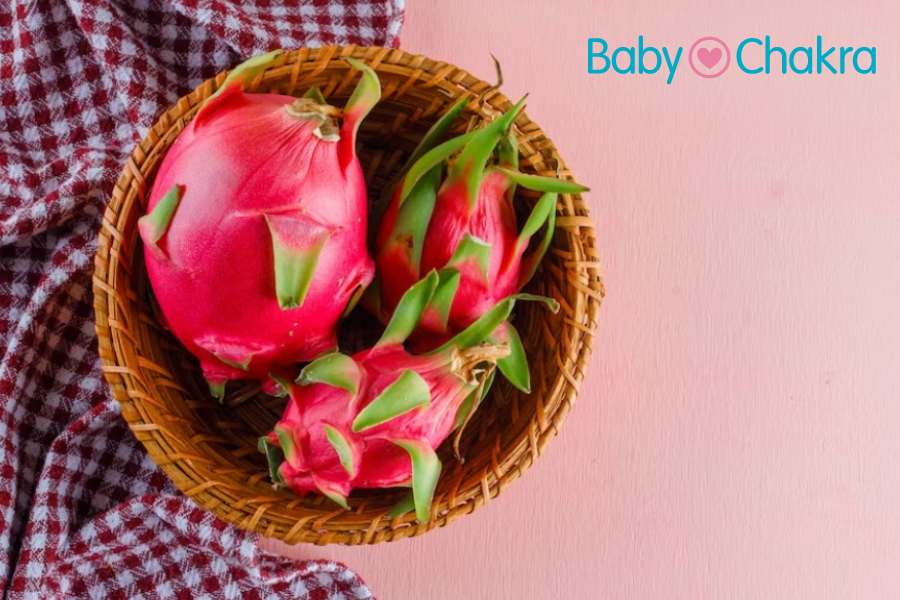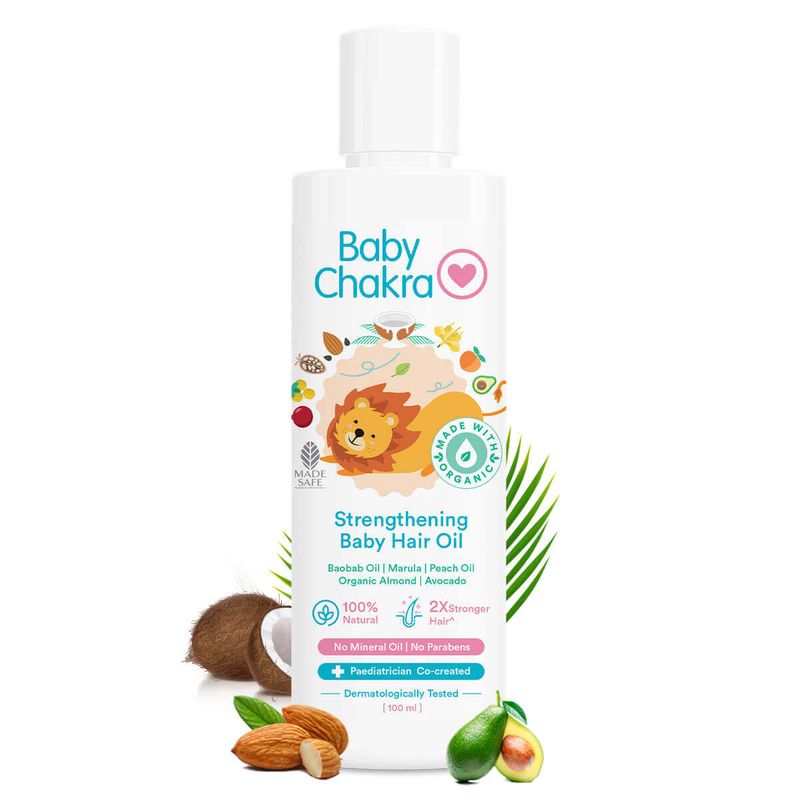
6 Health Benefits Of Eating Dragon Fruit In Pregnancy
4 Jul 2022 | 6 min Read
Sudeshna Chakravarti
Author | 799 Articles
Dragon fruit, also known as pitaya, is a colourful tropical fruit, native to Central and South America. It is packed with several nutrients, such as fibre and protein, and tastes sweet and refreshing. You can safely consume dragon fruit in pregnancy, however, before adding it to your diet, consult your doctor to prevent the possible risk of fruit allergy and other complications.
Several types of dragon fruits are available, but all of them have textured and scaly outer skin and soft magenta, red, or white-coloured edible flesh with tiny black seeds embedded in them. You can pick any variety of dragon fruit, once your doctor gives you a go-ahead on them.
Read on as we tell you more about the benefits, nutritional value, and possible side effects of consuming dragon fruit during pregnancy. We have also included some helpful tips to add this colourful and sweet fruit to your diet.
Is It Safe to Eat Dragon Fruit During Pregnancy?
Dragon fruit contains carbohydrates, sugars, dietary fibre, calcium, and sodium, and is believed to be extremely beneficial for pregnant women. But ensure to consume this fruit in limited amounts, as any item if consumed in excess during pregnancy can cause health complications like nausea and allergy.
How Much Dragon Fruit Can You Safely Eat In a Day?
An average-sized dragon fruit weighs around 350-400 gms. Ideally, expecting mums are recommended to consume at least 200 gms of fruits daily. Hence, you can have half a dragon fruit per day, but if you are still unsure about its intake, talk to your doctor to decide the recommended quantity.
Nutritional Profile of Dragon Fruit
According to the FDA, dragon fruit is enriched with energy-enhancing nutrients like carbohydrates and fibre. The same agency connotes that a 100 gm serving of dragon fruit can offer you the following nutrients that could help meet your pregnancy needs.
| Nutrients | Recommended Dietary Allowance (RDA) | Per 100 gm Of Dragon Fruit |
| Calories | 1800-2400 Calories | 264 kcal |
| Dietary Fibre | 28 gm | 1.8 mg |
| Carbohydrates | 175 gm | 82.1 gm |
| Calcium | 1000 mg | 107 mg |
| Vitamin C | 85 mg | 6.4 mg |
6 Health Benefits of Having Dragon Fruit In Pregnancy
Besides tasting unique and refreshing, dragon fruit may be beneficial to your health in the following ways.
- Offers relief from constipation: Dragon fruit is a good source of dietary fibre, and can help soothe your constipation to some extent. Moreover, having fibre can help flush out the toxins from your body and maintain good digestive health.
- Prevents the risk of anaemia: According to a study published in the Belitung Nursing Journal, consuming dragon fruit juice can have positive effects on the haemoglobin and electrolyte levels in pregnant women.
- Assists in bone development: Dragon fruit is rich in calcium and phosphorus and can assist in the bone development of your baby. These minerals also work toward stimulating your muscle function and enhancing your dental health during pregnancy.
- Prevents the risk of preeclampsia: Consumption of dragon fruit can help regulate your blood pressure levels and prevent the risk of hypertension, which can in some cases lead to pregnancy complications like preeclampsia.
- Protects against free radicals: Dragon fruit exhibits antioxidant effects that can offer protection against free radicals and infections caused by microbes.
- Prevents birth defects in the fetus: This fruit is a good source of folate and vitamin B-complex group that play a crucial role in the development of your baby’s nervous system. Having dragon fruit during pregnancy can aid in your baby’s neural development and reduce the risk of birth defects.
Possible Side Effects of Consuming Dragon Fruit In Pregnancy
The good news is that there are no major side effects of having dragon fruit in pregnancy. But if you experience any kind of allergic reaction, such as sneezing, itching, rashes, or a burning sensation in your mouth, then it’s best to refrain from eating it and consult your doctor for guidance.
Also, even if you are not allergic to dragon fruit, you must eat it in moderation, as excess consumption of any food item during pregnancy may lead to stomach problems and nausea.
Is Dragon Fruit Beneficial for Gestational Diabetes?
According to the Defeat Diabetes Foundation, dragon fruit seeds can help in regulating your blood sugar levels and can hence help in preventing and managing type-2 diabetes. However, this theory lacks enough scientific evidence, and hence we cannot definitively say whether dragon fruit is beneficial for gestational diabetes. If you are unsure, it’s best to talk to your doctor before adding it to your diet.
Simple Ways to Include Dragon Fruit In Your Pregnancy Diet?
Here are some ways you can include dragon fruit in your pregnancy diet.
- Cut the inside of the fruit, either in slices or cubes. Mix the slices with other fruits or add them to your salad bowl to add more texture and taste.
- Consider making a jam with the flesh of the dragon fruit and have it with pancakes or bread.
- Make a smoothie or milkshake with the edible part of the fruit and have it during your breakfast or as a snack.
Conclusion
Dragon fruit is known for its rich and sweet taste and its health-benefiting qualities. You can safely have dragon fruit in pregnancy to fulfill your increased nutrition demand and keep a check on your overall health. But do ensure to consult your doctor to determine its recommended quantities as excess consumption of this fruit, or any food item for that matter can lead to undesirable outcomes.
Recommended Baby Care Products:
FAQs
Does dragon fruit have folic acid?
Yes, dragon fruit has folic acid and nourishes the developing nervous system of the foetus and helps reduce the likelihood of certain birth defects, including spinal cord and brain abnormalities.
Also read: Folic Acid in Pregnancy
Is dragon fruit good for conceiving?
Loaded with Vitamin B1, B2, B3, C and minerals like iron, calcium and phosphorus along with active antioxidants, dragon fruit can help women to have a higher chance of conception.
Who should not eat dragon fruit during pregnancy?
In case you experience any allergic reactions such as itching, sneezing, rashes, or a burning sensation in the mouth after consuming a dragon fruit, it is advisable to avoid it.
Also read:
Sugarcane juice in pregnancy: Here’s everything you need to know about having sugarcane juice in pregnancy and its possible side effects.
Eating jamun during pregnancy: Is it safe to eat jamun during pregnancy? Find out in this post.
Foods to avoid during the first trimester of pregnancy: Did you know that these fruits should be avoided during the first trimester of your pregnancy?
Cover Image Credit: Freepik.com
A


Suggestions offered by doctors on BabyChakra are of advisory nature i.e., for educational and informational purposes only. Content posted on, created for, or compiled by BabyChakra is not intended or designed to replace your doctor's independent judgment about any symptom, condition, or the appropriateness or risks of a procedure or treatment for a given person.



